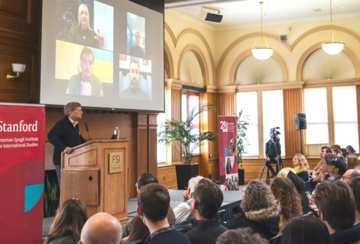
As a Center Fellow, Kuo will continue to advance her research agenda at the Center on Democracy, Development and the Rule of Law, exploring both the challenges facing American democracy today and their roots.

The Shinsho Taisho Award honors Tsutsui, the Henri H. and Tomoye Takahashi Professor and Senior Fellow in Japanese Studies at the Shorenstein Asia-Pacific Research Center, for his book 'Human Rights and the State,' listing it among the 10 best books of 2022 in Japan.

Cybersecurity, surveillance, and military retaliation: Why some balloons bust–and others don’t
So, what was it about this particular incident that generated such swift, bipartisan calls for a military response?

The Walter H. Shorenstein Asia-Pacific Research Center (APARC) inaugurated the “Asia in 2030, APARC@40” conference series to commemorate the Center’s 40th anniversary and explore the diverse ways that Asia has transformed and continues to transform over the years.
Music Beyond Boundaries
Graduate student Marie Fujimoto reflects on a course co-taught by SPICE Director Gary Mukai and former CASEER Director Hideto Fukudome.

To commemorate the first year of the full-scale invasion of Ukraine, Ukrainian leaders joined a panel hosted by the Freeman Spogli Institute for International Studies to express their hopes for victory and their gratitude for Western support.
The Center on Democracy, Development and the Rule of Law is proud to announce the launch of a new free massive open online course aimed at providing participants with a foundational knowledge of the best means for enacting effective policy change in their home countries.
We watched 100 hours of TikTok videos while waiting for a research API. Will it be worth the wait?

Former Draper Hills Summer Fellow Sergiy Leshchenko joins Michael McFaul on World Class from Kyiv, where he describes what the country looks like after a year of brutal fighting and shares what progress he hopes to see in the coming year.
Why Ukraine Must Win
As the first anniversary of the invasion of Ukraine approaches, former President of Mongolia Elbegdorj Tsakhia urges the democratic world to rally with even greater resolve to declare that freedom is non-negotiable, and to give Ukraine the weapons it needs to win.

BURMA Act can open way for stronger support to resistance movement
Recent disclosures that President Joe Biden, former President Donald Trump, and former Vice President Mike Pence stored classified documents at home have shined a spotlight on what many people believe to be excessive government classification of information.

The time has come to depoliticize North Korean human rights. South Korean progressives have argued that working to improve human rights in North Korea threatens to worsen inter-Korean relations and makes addressing security threats difficult, but the Moon administration failed to make progress in security or relations despite sidelining human rights. The Yoon administration should work on multilateral approaches to address the state of human rights in the North and reach a domestic bipartisan consensus on the issue.

Chief Information Officers representing specialties across the Department of Defense met with Michael McFaul, Scott Sagan, and Amy Zegart to discuss the war in Ukraine and how it’s changing the discussion around cyber defense, nuclear policy, and deterrence.
The initial set of results of the Stanford Japan Barometer, a new periodic public opinion survey co-developed by Stanford sociologist Kiyoteru Tsutsui and Dartmouth College political scientist Charles Crabtree, indicate that most Japanese are in favor of recognizing same-sex unions and reveal how framing can influence the public attitude toward LGBTQ communities.
The death of Mahsa Amini in Iran has ignited protests unlike anything seen in the country since the 1970s and might be the spark that finally lights the way for democratic reforms, Dr. Abbas Milani tells Michael McFaul on the World Class Podcast.

Hosted in collaboration with the CSIS Trustee Chair in Chinese Business and Economics, this Big Data China event provided an overview of the latest data-driven research evaluating the influence of China’s party-state on China’s companies and their ability to maintain autonomy.

The vulnerability of critical infrastructure and financial systems to cyber operations remains a primary concern for national security
In this JAMA Health Forum commentary, SHP's Michelle Mello and colleagues argue that the $1.7 trillion omnibus bill that Congress passed in December 2022 responds to several urgent public health needs, yet only narrowly addresses some of the critical determinants of pandemic preparedness.
Stanford e-Japan is made possible by the Yanai Tadashi Foundation.

“When I Get Grown: Reflections of a Freedom Rider,” a film based on Dr. Clayborne Carson's interviews with American civil rights activist Bernard Lafayette, is available to stream for free throughout the month of February.
In opening his annual remarks to the United Nations General Assembly in New York, UN Secretary-General António Guterres emphasized the need for member countries to address the dire international security situation, as described in this year’s Doomsday Clock statement.
Toward Equal Footing
In this Q&A, Stanford Health Policy's Alyce Adams talks about the devastating impact that chronic conditions like diabetes had on her own family members.















